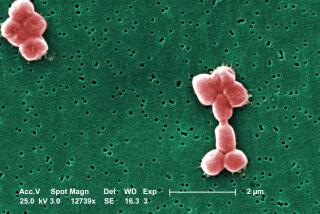Bacteria Product May Help Treat Kaposi’s Sarcoma
- Share via
A compound produced by bacteria may hold promise as a treatment for Kaposi’s sarcoma, a cancer frequently associated with AIDS, according to researchers at USC and the National Cancer Institute in Bethesda, Md.
The preliminary findings, from lab tests and experiments on mice, were reported in today’s issue of the journal Science.
The compound, known as SP-PG, occurs naturally in the cell wall of the arthrobacter bacteria. Although it has yet to be tested in humans, SP-PG has attracted the interest of AIDS researchers. This is because it appears to be less toxic than other drugs used to treat the tumor and because much of the work has been done in the lab of Dr. Robert C. Gallo at the National Cancer Institute, a co-discoverer of the AIDS virus.
The research is one of a series of recent developments involving the mysterious tumor, which is 10 times more common in homosexual or bisexual men with AIDS than in others with the deadly disease.
Some scientists believe that Kaposi’s sarcoma is caused by a second infectious agent, unrelated to the human immunodeficiency virus that causes AIDS. A recent study by the New York University School of Medicine suggested a role for human papillomavirus, which causes genital warts and is suspected to play a role in cervical cancer. But this relationship has yet to be proved.
In separate studies also being published in Science, researchers at UCLA and the National Cancer Institute identified a growth factor that helps the tumor to grow. The protein, known as oncostatin M, blocks the growth of most cancer cells, but stimulates the growth of Kaposi’s sarcoma.
The new research “really provides a gold mine of things to go after,” said Dr. Steven A. Miles of UCLA Medical Center, the principal author of one of the reports.
Kaposi’s sarcoma is a tumor that appears to originate in cells that line blood vessels. It usually appears as red or purple painless spots on the skin, but may also afflict internal organs.
While the tumor is usually not the cause of death for AIDS patients, it can be debilitating. Current treatments, such as alpha interferon, may fail to bring the tumor under control and may have side effects, such as flu symptoms and low white blood cell counts.





